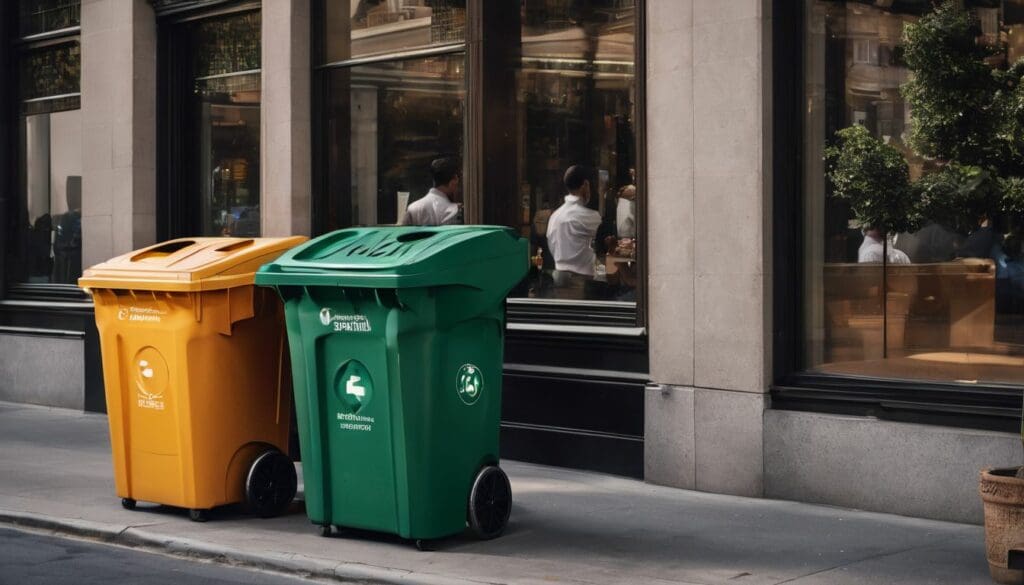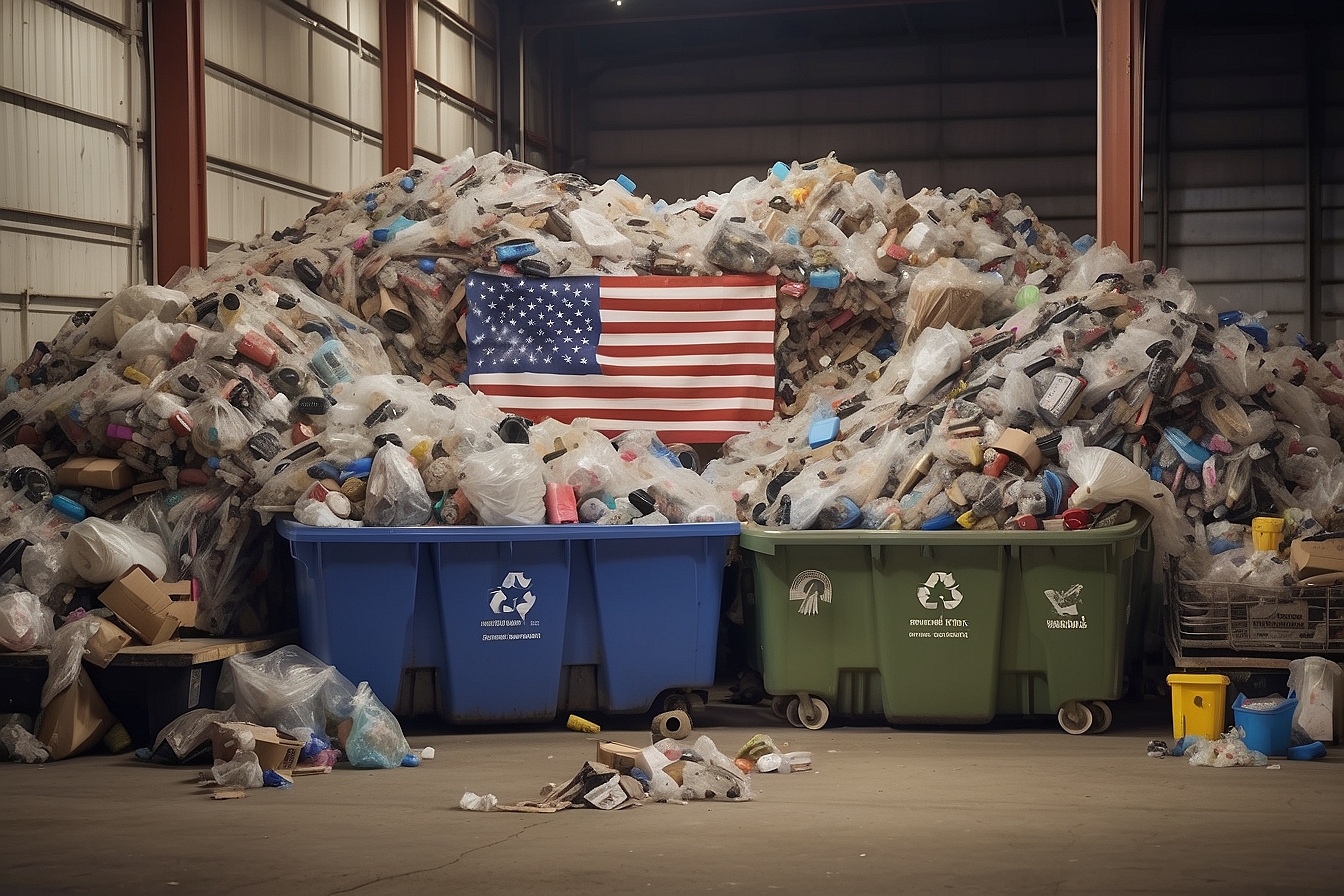We’ve all experienced that disheartening moment, standing in front of bins brimming with a jumble of rubbish, the nagging question looming in our minds – are we helping or hindering the earth beneath our feet? Rest assured, you’re not alone.
Many of us find ourselves scratching our heads in bemusement, contemplating which bit goes in which bin. However, it’s heartening to know that proper waste segregation can markedly diminish pollution.
Through this thorough exploration into the art of recycling, we’ll arm you with straightforward yet effective strategies for sorting out your refuse like a seasoned eco-warrior. So brace yourself – by the end of this journey, you’ll be making an authentic contribution to safeguarding our precious environment!
Key Takeaways
- Separating waste into recyclable, biodegradable, and non – recyclable categories is essential to reduce pollution and conserve natural resources.
- Adhering to UK laws on waste segregation can help avoid penalties while promoting environmental conservation and resource recovery.
- Effective waste management practices like recycling and composting not only save money but also protect public health by reducing exposure to harmful substances.
- By preventing the release of greenhouse gases from landfills, proper waste segregation helps mitigate climate change and ensures a healthier ecosystem.
- Businesses that implement strong waste segregation systems can benefit financially from lower disposal costs and potential revenue from selling recyclables.
Importance of Waste Segregation
Waste segregation is crucial for preventing environmental problems such as pollution and resource depletion, in line with UK laws. It also significantly reduces waste management costs through proper disposal techniques.
Environmental problems
Let’s face it, our environment suffers drastically from improper waste management. Ignoring the segregation of waste contributes to pollution and places heavy stress on our ecosystems.
Throwing away items that could be recycled or composted adds to the mountains of trash in landfills which emit harmful greenhouse gases. These emissions affect air quality and contribute to climate change.
By separating biodegradable from nonbiodegradable waste, we reduce resource consumption and preserve natural habitats. It helps in preventing toxins from leaching into the soil and water bodies, safeguarding wildlife and human health alike.
As environmentally conscious individuals, embracing effective segregation techniques is crucial for environmental sustainability. Moving beyond the glaring problems, we must also consider how UK laws shape our approach to tackling these issues.
UK laws
The UK laws mandate waste segregation to minimise environmental impact. Regulations require individuals and businesses to separate recyclable, biodegradable, and non-recyclable waste.
As a result, these laws help in reducing pollution and promoting resource recovery.
Moreover, the government enforces penalties for non-compliance with waste segregation regulations. By adhering to these laws, we can actively contribute to environmental protection and conservation efforts in our communities.
Cost reduction
Reducing waste through proper segregation can lead to significant cost reductions. Implementing effective waste management practices, such as separating recyclables and compostable materials from general waste, can lower disposal expenses.
Additionally, reusing items and reducing overall waste production saves money by decreasing the need for new resources. By actively participating in waste segregation efforts, we contribute to a more sustainable environment while simultaneously cutting down on unnecessary costs associated with excessive waste.
Investing in proper waste segregation not only benefits the environment but also provides an opportunity for financial savings. Through conscious separation of different types of waste, we can effectively reduce our environmental impact while promoting a more economically efficient lifestyle.
Pollution prevention
Pollution prevention is crucial in our efforts to protect the environment. By properly segregating waste, we can reduce the amount of harmful pollutants that end up in landfills or waterways.
This not only minimises the risk to public health but also lowers greenhouse gas emissions and helps sustain a more balanced ecosystem. Implementing effective waste management practices, such as reusing materials and embracing composting, contributes to a sustainable living environment while conserving valuable resources for future generations.
Incorporating pollution prevention into our daily habits brings us closer to achieving a circular economy where we prioritise resource conservation and minimise environmental impact.
Proper Waste Segregation and Disposal
Proper waste segregation and disposal lead to lower waste costs, improved public health, and protection of the environment. Read more about why waste segregation matters in our blog!
Lower waste costs
Segregating waste at the source decreases overall waste disposal expenses. When waste is separated and recycled, less goes to landfills or incinerators, saving on disposal fees. Additionally, businesses can generate revenue from selling recyclable materials rather than paying for their disposal.
Moreover, properly managed organic waste can be converted into compost or biogas through anaerobic digestion systems, thus reducing the need for chemical fertilisers and lowering operational costs.
By responsibly managing our waste stream, we contribute to a more sustainable environment while also benefiting financially. Businesses can take advantage of this cost-saving opportunity by implementing effective waste segregation practices across their operations.
Improved public health
Improving public health is a critical benefit of proper waste segregation. When waste is managed effectively, the risk of diseases spreading due to unmanaged rubbish decreases substantially.
Reusing and recycling materials reduces the need for landfill disposal, resulting in fewer pollutants in the air and water. This not only protects the environment but also safeguards human health by reducing exposure to harmful substances.
Segregating waste helps control contamination from hazardous materials, which can leach into soil and water sources, impacting public health negatively. By sorting biodegradable waste from non-biodegradable items at the source, we can significantly reduce pollution and contribute to healthier communities.
Protection of the environment
Proper waste segregation and disposal play a crucial role in protecting the environment. By separating recyclable materials from general waste, we can reduce the amount of garbage sent to landfills, conserving natural resources and minimising pollution.
Through this method, we contribute to preserving the beauty of our surroundings for future generations.
Moreover, effective waste management significantly decreases greenhouse gas emissions and energy usage. This ensures a healthier and safer environment for all living organisms by reducing harmful air pollutants and their adverse effects on ecosystems.
Conclusion
In conclusion, waste segregation is crucial for protecting the environment and public health. It helps reduce environmental problems such as pollution and landfill usage. Proper waste segregation also leads to cost reduction and fulfills legal requirements in the UK.
FAQs
1. What is waste segregation and why is it important?
Waste segregation means sorting garbage into different categories for reuse or recycling, playing a vital role in solid waste management to protect the environment.
2. How can I start segregating my waste at home?
You can begin by separating your solid waste into recyclable, compostable, and landfill-bound materials, using different bins for each type of garbage.
3. Does segregating waste really make a difference?
Yes! By keeping different types of garbage separate, you help ensure that materials are handled correctly and efficiently as part of good solid waste management practices.
4. What are the benefits of proper garbage segregation?
Proper garbage segregation aids in recycling processes, reduces pollution from landfills, conserves natural resources through reuse opportunities and supports sustainable environmental practices.





